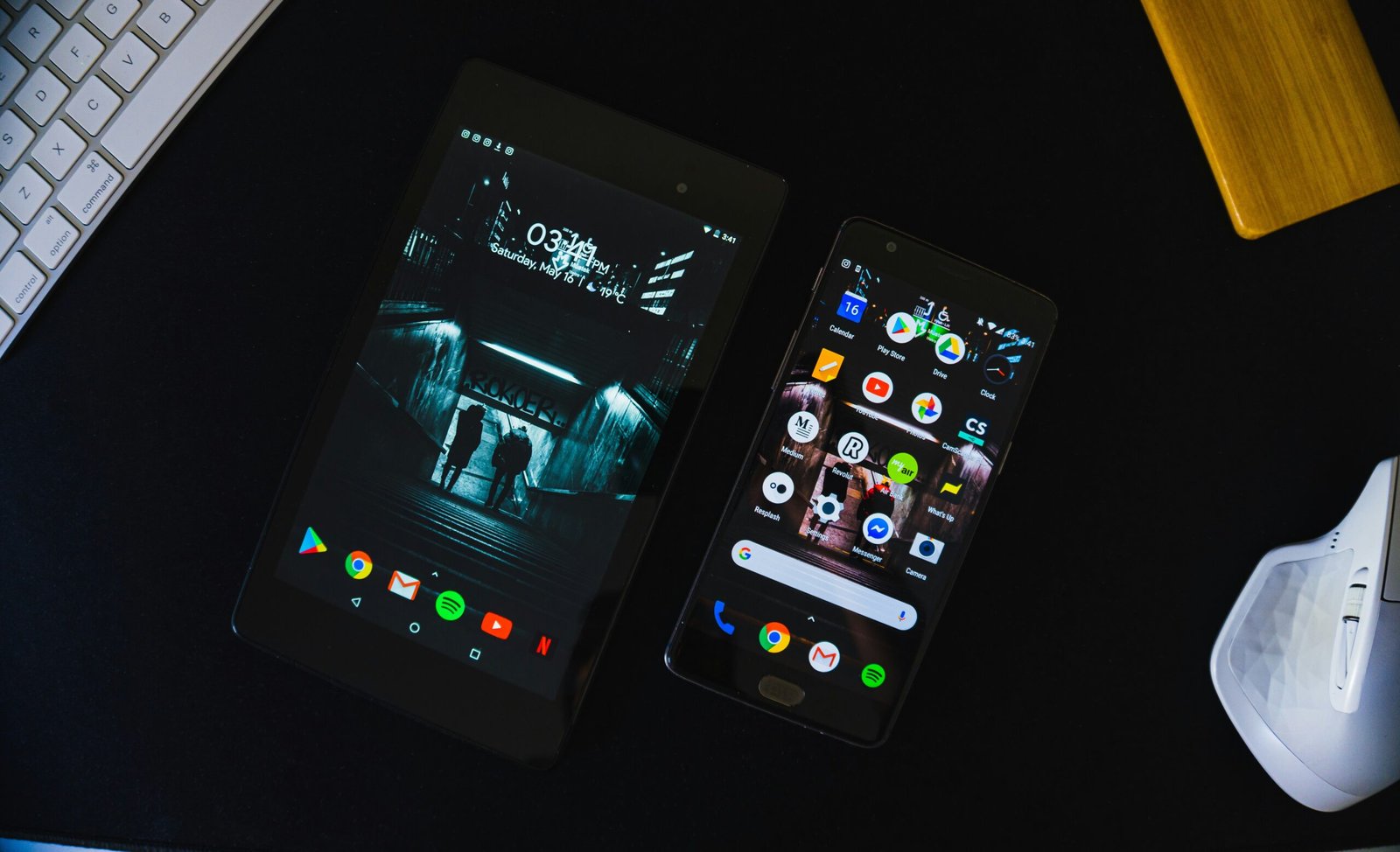
Introduction to Mobile Technology Trends
The landscape of mobile technology has undergone significant transformations in recent years, characterized by rapid advancements that continue to shape how we interact with the world. With the advent of smartphones, the mobile experience has progressed from basic communication tools to sophisticated devices that merge functionality with entertainment, connectivity, and productivity. As a result, staying informed about the latest trends within this dynamic sector is essential for both users and developers striving to leverage emerging opportunities.
One prominent trend is the escalating demand for 5G connectivity, which is revolutionizing mobile communication by offering high-speed data transfers and reduced latency. This infrastructure empowers not only personal device usage but also enhances industries reliant on technology, fostering innovations in areas such as telemedicine, autonomous vehicles, and smart cities. Consequently, understanding the implications of such advancements enables users to utilize mobile devices more effectively, while developers can create applications that capitalize on these improved capabilities.
Moreover, mobile technology is increasingly becoming synonymous with artificial intelligence (AI) integration. Features such as voice assistants, predictive text, and personalized content recommendation systems demonstrate the tech industry’s commitment to creating seamless user experiences. These features enhance device usability, dictating how users engage with mobile applications. Alongside such developments, the proliferation of mobile payment systems is further underscoring a shift in consumer behavior toward cashless transactions, corroborating the notion that the future is indeed mobile-centric.
In light of these trends, it becomes imperative for stakeholders within the tech ecosystem to remain agile and responsive. By understanding the evolving nature of mobile technology, users can make informed decisions, while developers can position themselves to meet the ever-changing demands of the market. Overall, keeping pace with these innovations is crucial for navigating the complexities of the future in mobile technology.
Key Innovations in Mobile Technology
The evolution of mobile technology has witnessed remarkable innovations that are set to redefine the landscape in the coming years. One of the most significant advancements is in hardware, particularly with the introduction of foldable screens. These screens not only provide users with an expansive display but also contribute to the portability of devices. The ability to seamlessly transition from a compact form factor to a larger screen further enhances user engagement and interactivity, catering to techie enthusiasts who demand versatility.
High-resolution cameras are another crucial hardware innovation driving mobile technology. With consumers increasingly relying on their devices for photography, manufacturers are incorporating multi-lens setups and advanced sensors that significantly improve image quality. Features such as night mode and AI-driven image processing are prevalent, enabling users to take professional-quality photos regardless of their environment. This shift marks a move toward making mobiles not just communication tools but also powerful content creation devices.
Battery technology has also seen pivotal advancements. As mobile devices become more powerful with high-performance processors and rich features, the need for robust batteries has intensified. Innovations in battery chemistry, such as lithium-silicon batteries, promise longer life and faster charging times, making it easier for users to stay connected and engaged throughout the day.
On the software front, the integration of artificial intelligence into mobile applications has fundamentally transformed user experience. AI-powered assistants provide smarter, context-aware interactions, streamlining tasks and enhancing personalization. Alongside this, the rollout of 5G connectivity is revolutionizing mobile technology by enabling higher data speeds and lower latency. Users can now enjoy seamless streaming, quick downloads, and augmented reality applications that were previously unfeasible. Additionally, enhanced user interfaces are making technology more accessible and intuitive, enriching the overall mobile experience.
The Rise of Artificial Intelligence in Mobile Devices
In recent years, artificial intelligence (AI) has emerged as a transformative force within mobile technology, reshaping the landscape of how users interact with their devices. As the demand for personalized experiences grows, mobile applications are increasingly integrating AI to enhance functionality and improve user satisfaction. This integration allows for smarter applications that can learn from user behaviors, preferences, and routines, providing tailored recommendations and automating tasks. For instance, virtual assistants equipped with AI capabilities can manage schedules, send texts, and even control smart home devices seamlessly, all tailored to individual user needs.
Moreover, the implementation of machine learning algorithms significantly bolsters communication features in mobile devices. AI-driven voice recognition technology enables users to interact with their smartphones using natural language, allowing for a more intuitive experience. This technological advancement not only simplifies interactions but also ensures efficient ways to handle complex tasks, such as setting reminders or navigating through various applications. Furthermore, image recognition powered by AI enhances the way users capture and share visual content, offering automatic tagging and editing functions that streamline the user experience.
As mobile technology continues to evolve, the future of AI integration within these devices appears promising. Innovations such as predictive typing, context-aware menus, and enhanced security features driven by biometric data represent the forefront of this revolution. Users can expect increased efficiency in their daily mobile interactions, with devices becoming more adept at anticipating needs and personalizing experiences. As developers continue to push the boundaries of AI capabilities, the mobile landscape will likely witness unprecedented advancements, fundamentally altering communication and app engagement for tech-savvy individuals.
Impact of 5G Technology on Mobile Usage
The rollout of 5G technology represents a significant milestone in the evolution of mobile communication, promising to reshape the way users interact with their devices and access information. With its enhanced speed and connectivity, 5G is set to deliver unprecedented data rates that are up to 100 times faster than its predecessor, 4G. This increase in speed is expected to transform various aspects of mobile usage, particularly in areas such as streaming, gaming, and real-time communication.
One of the most notable impacts of 5G on mobile usage is its ability to support ultra-high-definition (UHD) content streaming. As mobile devices become more central to entertainment consumption, 5G technology enables users to stream 4K and even 8K videos seamlessly without buffering. This capability will foster the growth of mobile viewing platforms, allowing for an enhanced user experience that was previously limited by lower bandwidths. Consequently, entertainment and media industries are poised to capitalize on this new technology, creating more immersive content that aligns with the demands of tech-savvy consumers.
Beyond entertainment, 5G is expected to revolutionize various sectors such as gaming and healthcare. In gaming, the low latency associated with 5G will facilitate more dynamic and interactive experiences, paving the way for mobile gaming to reach new heights. Meanwhile, in healthcare, mobile devices can leverage 5G networks to connect patients and providers in real time. This advancement will enhance telemedicine capabilities, enabling remote consultations and diagnostics to become standard practice, improving patient care, and optimizing healthcare workflows.
Additionally, the integration of 5G technology across industries will lead to a surge in innovations. The anticipated rise of the Internet of Things (IoT) will further enhance mobile applications through interconnected devices communicating instantaneously, contributing to a more integrated ecosystem. Overall, the impact of 5G technology on mobile usage is profound, setting the stage for a tech-driven future where connectivity and speed are reshaping our daily interactions and experiences.
The Future of Mobile App Development
The landscape of mobile app development is undergoing significant transformation as it adapts to the changing demands of users and the advancements in technology. Among the most noteworthy trends is the rise of low-code and no-code development platforms. These platforms are empowering individuals without a technical background to create functional applications with minimal coding skills. This democratization of app development is not only accelerating the process but also encouraging more innovation in the mobile sector.
Another emerging trend is the increased popularity of Progressive Web Apps (PWAs). PWAs combine the flexibility and accessibility of web applications with the capabilities of native mobile applications. They offer users a seamless experience—loading quickly, functioning offline, and providing push notifications—despite being accessed via a web browser. This approach is particularly appealing for developers seeking to reduce the resource allocation required for maintaining separate native apps for different operating systems.
User privacy and security have taken center stage in the design of mobile applications. With growing concerns surrounding data breaches and misuse of personal information, developers are now more focused than ever on building security features into their applications from the ground up. This shift acknowledges the importance of not only meeting regulatory requirements but also fostering user trust, which is essential for the successful deployment of mobile solutions. Ensuring robust data protection protocols within app frameworks will be paramount for maintaining a competitive edge in the techie landscape.
As these trends continue to evolve, mobile app development will increasingly emphasize enhanced user experience, greater accessibility, and stringent security measures. The interplay of these factors will likely shape the future of mobile technology, fostering innovation and creating new opportunities in the tech ecosystem.
Sustainability and Its Role in Mobile Technology
The advent of mobile technology has significantly transformed how we communicate, access information, and conduct our daily lives. However, this rapid development has also raised critical concerns regarding the environmental impact of mobile devices. As consumers become increasingly aware of sustainability, there is a growing demand for eco-friendly materials and practices within the mobile tech industry. This trend reflects a broader global acknowledgment of the need for sustainable solutions that minimize harmful effects on our planet.
One key aspect of sustainability in mobile technology is the need for eco-friendly materials. Manufacturers are now prioritizing biodegradable and recyclable components, which help reduce e-waste and the overall carbon footprint of mobile devices. By shifting towards using sustainable plastics, metals, and other materials, tech companies not only contribute to environmental preservation but also cater to a new consumer demographic that values sustainability. This demand for greener alternatives is pushing the mobile industry to innovate and adapt their production processes.
Furthermore, recycling programs play a crucial role in promoting sustainability within mobile technology. Many manufacturers have begun initiating take-back programs that encourage consumers to return old devices for proper recycling and disposal. These programs not only help mitigate the negative impacts of discarded electronics but also provide opportunities for manufacturers to recover valuable materials. Consumers are increasingly participating in these programs, driven by a desire to contribute to a more sustainable future.
Additionally, the development of energy-efficient devices is another pressing issue in the mobile sector. Innovations in battery technology aim to extend the life cycle and performance of mobile gadgets while reducing energy consumption. The rise of energy-efficient designs highlights a commitment to sustainability, as they significantly lower operational energy requirements. By integrating these principles, the mobile industry can lead the charge towards a more sustainable and responsible future in technology, aligning with the evolving expectations of eco-conscious consumers.
Exploring Mobile Security Challenges
As mobile technology continues to evolve, the security challenges associated with its use are becoming increasingly prominent. The prevalence of smartphones and mobile applications has created a fertile ground for various cyber threats, particularly malware and phishing attacks. Mobile devices often contain sensitive personal information, making them attractive targets for cybercriminals. Malware can infiltrate devices through seemingly benign apps or links, leading to data breaches and identity theft.
Phishing, a technique employed by cybercriminals to deceive users into revealing confidential information, has also adapted to mobile platforms. With the rise of mobile communication, attackers are employing sophisticated tactics such as SMS phishing (smishing) and voice phishing (vishing) to exploit unsuspecting users. Users may receive messages or calls that appear legitimate but are, in fact, attempts to gain access to personal data or financial information.
Given these threats, implementing strong cybersecurity measures is essential for mobile users. Utilizing robust antivirus software, regularly updating operating systems and applications, and educating oneself about the latest security threats can significantly reduce the risk of attacks. Furthermore, users should develop safe browsing habits, such as avoiding public Wi-Fi networks for sensitive transactions, to further protect their mobile devices from cyber threats.
In response to the increasing demand for secure solutions, advancements in biometric authentication technologies are playing a critical role in safeguarding mobile devices. Features such as fingerprint recognition, facial recognition, and iris scanning are becoming standard in modern smartphones, providing an additional layer of security. These biometric systems not only enhance user convenience but also make it more challenging for unauthorized individuals to gain access to the device and its information.
Addressing the mobile security challenges of today is imperative for ensuring user safety in the dynamic tech landscape. By remaining informed and embracing advancements in security protocols, users can navigate the mobile future with greater confidence.
The Role of Mobile Technology in Remote Work and Education
In recent years, mobile technology has dramatically transformed both remote work and education, ushering in a new era characterized by flexibility and accessibility. The proliferation of mobile devices has enabled individuals to engage in work and learning from virtually anywhere, fostering a level of convenience that was previously unattainable. Multiple tools and applications such as Zoom, Microsoft Teams, and Google Classroom exemplify the integration of mobile technology in facilitating remote communication and collaboration. These platforms empower users to connect seamlessly, participate in virtual meetings, and access educational resources on their mobile devices.
The ability to access work documents and educational materials from a smartphone or tablet has disrupted traditional paradigms of both environments. With mobile technology at the forefront, professionals and students can work or study from home, on public transport, or in cafes, thus redefining the concept of the workplace and classroom. Moreover, the rise of mobile applications has allowed for more interactive and engaging learning experiences, where educational content is not only accessible but also tailored to individual learning styles through gamification and on-demand resources.
However, the shift towards mobile-centric environments has not been devoid of challenges. Organizations and educational institutions must navigate issues such as digital inequality, where a lack of access to essential mobile devices and high-speed internet can hinder participation. Additionally, security concerns arise as sensitive data is increasingly shared through mobile applications, necessitating robust digital protection measures. As businesses and schools continue to adapt to this new landscape, understanding the balance between leveraging mobile technology effectively and addressing these challenges is crucial for fostering a productive remote work and learning environment.
Looking Ahead: The Next Decade in Mobile Technology
The next decade promises remarkable advancements in mobile technology, driven by innovations that are likely to reshape not only devices but also the applications and experiences associated with them. One notable area of development is augmented reality (AR). With the integration of AR into mobile applications, users will be able to overlay digital information onto the physical world in real-time. This technology is poised to revolutionize industries such as retail, education, and entertainment, offering immersive experiences that blur the lines between the digital and physical realms. As mobile users become accustomed to these capabilities, the demand for AR-enabled applications is expected to grow significantly.
Another critical trend in mobile technology is the rise of virtual reality (VR). As VR experiences become more accessible via mobile devices, individuals and businesses will find new ways to engage with content, train employees, and market products. Imagine attending a VR-driven product launch event from the comfort of one’s living room or participating in interactive training sessions that simulate real-world scenarios. Such innovations will redefine conventional practices and expand the mobile ecosystem.
Advancements in quantum computing could also profoundly influence mobile technology. As this area of research progresses, the potential for increased processing power will open up opportunities for more complex applications that rely on heavy computational tasks. Mobile devices could seamlessly process vast amounts of data, leading to innovations in artificial intelligence (AI) and machine learning (ML) capabilities on mobiles. This integration would enhance personalization and efficiency across various sectors, from healthcare to finance.
Overall, the next decade will likely see an extraordinary fusion of AR, VR, and quantum computing within mobile technology, leading to transformative experiences that enhance both personal and professional life. With these innovations on the horizon, it becomes increasingly vital for businesses to stay abreast of these trends to leverage their potential effectively.







Leave a Reply